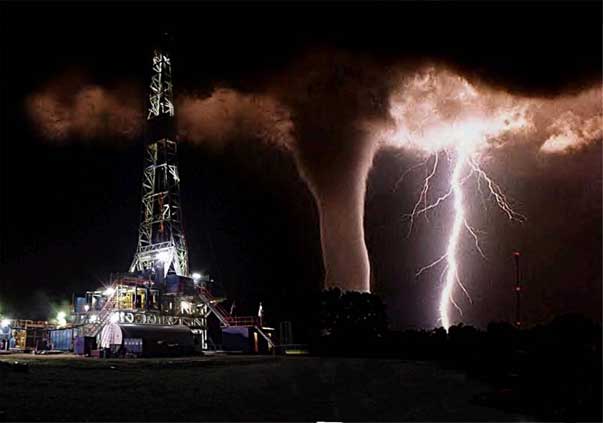
The disastrous tornado that recently devastated Oklahoma has left some dead, others injured, and many without homes. There has been much debate about how to provide the much needed aid to victims. The debate around how to disburse aid is divided largely on party lines, with Republicans demanding that relief spending be offset before it is sent, and Democrats arguing that budgeting should be dealt with after Oklahomans are taken care of.
| Image source: http://www.hoax-slayer.com/oil-rig-tornado-photo.shtml |
For instance, Sen. Tom Coburn (R-OK) has stated that relief spending must be offset by spending cuts elsewhere in the federal budget. Ironically, Sen. Inhofe (R-OK), who voted against relief for victims of hurricane Sandy, is strongly in favor of relief for his constituents in Oklahoma. When pressed for answers about this inconsistency, Inhofe explained that “that was totally different … for instance that was supposed to be in New Jersey, they had things in the Virgin Islands, they were fixing roads there, they were putting roofs on houses in Washington, D.C.”However, as Salon's Joan Walsh points out, this is incredibly dishonest, as the destruction from hurricane Sandy did, in fact, cause damage in those areas.
Republicans are quick to point out that the $11.6 billion that FEMA has available for disaster relief should be sufficient to cover the costs associated with the tornado. Democrats worry that additional funds may be required, and that if that happens, the funds shouldn't be given conditionally. As Senate Appropriations Chairwoman Barbara Mikulski (D-Md) said, "This is not the time for a 'budgeteering' battle.” She may have a good point about this, as vital aid for hurricane Sandy was delayed by several weeks while Republicans debated budget technicalities.
After-the-fact disaster aid is not all that is called into question by this debate.The Safe Room Rebate Program, a fund which helped families in Oklahoma construct safe rooms to protect themselves from natural disasters such as this, was suspended some months ago due to a lapse in federal funding. Three months before the tornado struck, the city of Moore lamented that: "The City's safe room rebate program is still 'on hold', with not a lot changed from our update of last May."
A solution that might satisfy both Republicans and Democrats, as well as long-suffering tornado victims, is to take those demanded budget cuts from a prime example of gross federal overspending: oil and gas subsidies. This is the solution suggested by the Huffington Post's Paul Abrams, who recommends that we “... eliminate the taxpayer subsidies that enable the top five oil companies to earn $118B instead of $116B they would earn without them.”
That big oil can survive without massive subsidies is not just a blind assertion. It is backed up by the numbers, as the Center for American Progress' Seth Hanlon reports.Just how well are big oil companies doing?
The five largest oil companies last week announced first-quarter profitsof $32 billion, up 30 percent from the first quarter of 2010. ExxonMobil Corp. alone reported quarterly earnings of $11 billion, nearly70 percent higher than a year ago, while BP p.l.c., Chevron Corp.,ConocoPhillips, and Royal Dutch Shell p.l.c. reaped the remaining $21billion.
On top of those record-high profits, U.S. taxpayers are giving away huge sums of money to oil companies—as much as $7 billion this year, according to Hanlon. One of the reasons for this strange state of affairs is a special type of tax deduction, available only to the oil and gas companies, called “percentage depletion.” What this means is that rather than deducting the investment cost of building something like an oil or gas well, big oil companies can deduct a percentage of the income they gain from the investment. Because of this, tax deductions are tied to revenues instead of costs, or more simply put, taxpayers give them more money when their profits arealready at their highest. It's clear that the oil industry will survive unharmed if these over-the-top subsidies are eliminated, and will “... have no effect on consumer prices for gasoline and natural gas in the immediate future,” according to Congress' Joint Economic Committee.
Getting Republicans and Democrats to agree on cutting subsidies to big oil is no longer a pipe dream either, as every Democrat on the Ways and Means Committee has been working with Chairman Dave Camp (R-MI) to support acts such as the “Ending Big Oil Tax Subsidies Act.” This act would repeal unreasonable subsidies to oil companies, freeing up large portions of the federal budget. Imagine how much good even a portion of those oil billions could do in Oklahoma right now.


